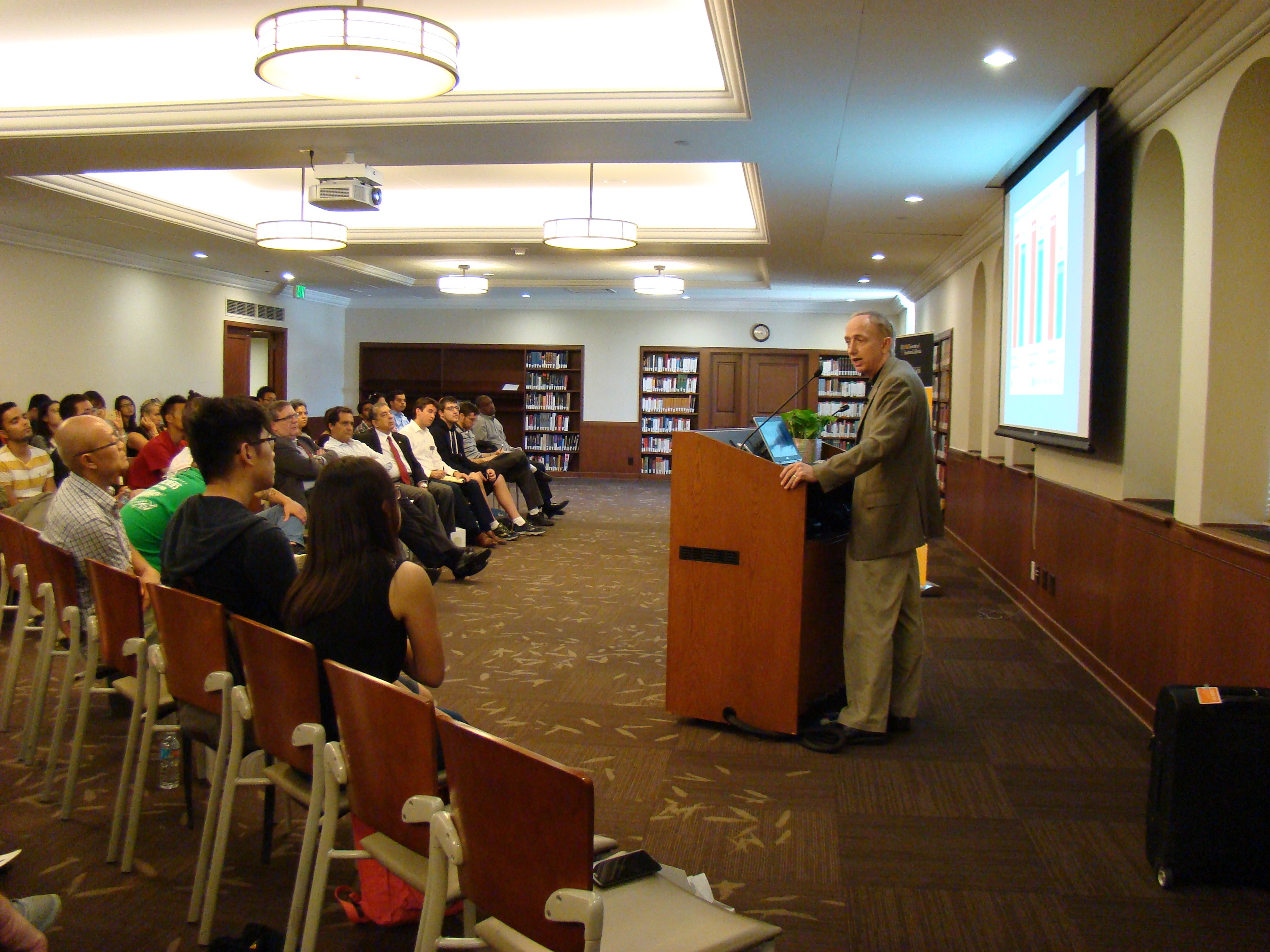News | Schwieterman Shares Research Comparing UberPOOL with Public Transit
Stop the VideoNews

METRANS UTC
Schwieterman Shares Research Comparing UberPOOL with Public Transit
Friday, September 16, 2016
by By Axel Hellman, MPL 2017

Photo by Blake Wagner
METRANS Transportation Center kicked off its Fall 2016 Research Seminar series with a presentation by visiting professor Joseph Schwieterman, Director of the Chaddick Institute for Metropolitan Studies at DePaul University in Chicago. The seminar was co-sponsored by the Associated Students of Planning and Development (ASPD) and the USC chapter of the American Planning Association (APA-USC).
Schwieterman is an authority on passenger travel, and his research project is entitled, “Have App Will Travel: Comparing the Price & Speed of Fifty Chicago Transit Authority (CTA) & UberPOOL Trips in Chicago.” UberPOOL is a service launched in late 2015 by the ride-hailing giant that allows riders to share their ride with another passenger, thus letting them split the fare and travel at a lower cost.
Research assistants gathered data by making trips using the public transit system and UberPOOL between randomly selected points in Downtown and the North Side of Chicago.
The results of the study showed that public transit was the most competitive on trips between residential neighborhoods and Downtown. 7 of 18 such trips were faster by public transit than by UberPOOL. The average transit trip in this category was only 6 minutes slower than UberPOOL, at less than a quarter of the price.
UberPOOL was a much speedier option for trips between residential neighborhoods, averaging a 20-minute time savings compared to transit, though it remained a costlier mode of transportation. Schwieterman attributed this to the radial, Downtown-focused layout of the Chicago “L” network.
Schwieterman concluded his presentation with a statistical regression of the results. It indicated that transit itself is not slower than UberPOOL, but walking time to bus/train stops and transfers caused much of the difference in travel time. “Transit agencies are understandably nervous about the dramatic changes taking place in how people make travel decisions. Fortunately, transit agencies are also on the move and creating new tech-friendly amenities, such as mobile ticketing and real-time schedule apps” he notes. At the end of his presentation, Schwieterman shared the preliminary data from the next phase of the project – a comparison of travel time by when using UberPOOL, transit, and bicycle. While the bicycle outperformed both other modes as the fastest mode of transportation, Schwieterman cautioned the audience that the weather in Chicago is not always conducive to riding a bike. “In Chicago, planners nonetheless consider strategically located bike corridors to be essential to encouraging more people to sell their cars and live more transit-oriented lifestyles,” he notes.
Over 50 practitioners, students, and professors came to hear Schwieterman’s seminar. First-year Master of Planning student Alex Yee saw connections between the seminar and transportation issues in Los Angeles.
“It was interesting to think about the comparisons between UberPOOL and public transit in the context of LA's transportation options,” he commented, “I would be curious to see a similar study done in other cities, but particularly here, given the large potential Uber has to disrupt the traditional car dependence that LA is known for.”
Another student who was drawn to the event was Connor Johnson, a junior studying real estate development. “I chose to attend this presentation because I have been exposed to the history and effects of public transit and its importance in long-term success for a city,” he said, “Here in Los Angeles, navigating the city is difficult as I don't have a car, so I do often use Uber if my destination is not reachable via the Expo Line. It was interesting to hear about Dr. Schwieterman's research into the data trends behind the trade-off between transit and Uber in Chicago.”
Axel Hellman
Hellman is a second-year Master of Planning student concentrating on Transportation and Infrastructure Planning, and a recent graduate of the Price School’s undergraduate program with a Bachelor’s degree in Policy, Planning and Development. He is interested in public transit operations, active transportation planning, and the role of private-sector companies in mass transit.
News Archive
- December (1)
- November (6)
- October (4)
- September (2)
- August (3)
- July (4)
- June (3)
- May (7)
- April (8)
- March (11)
- February (8)
- January (7)
- December (7)
- November (8)
- October (11)
- September (11)
- August (4)
- July (10)
- June (9)
- May (2)
- April (12)
- March (8)
- February (7)
- January (11)
- December (11)
- November (5)
- October (16)
- September (7)
- August (5)
- July (13)
- June (5)
- May (5)
- April (7)
- March (5)
- February (3)
- January (4)
- December (4)
- November (5)
- October (5)
- September (4)
- August (4)
- July (6)
- June (8)
- May (4)
- April (6)
- March (6)
- February (7)
- January (7)
- December (8)
- November (8)
- October (8)
- September (15)
- August (5)
- July (6)
- June (7)
- May (5)
- April (8)
- March (7)
- February (10)
- January (12)















